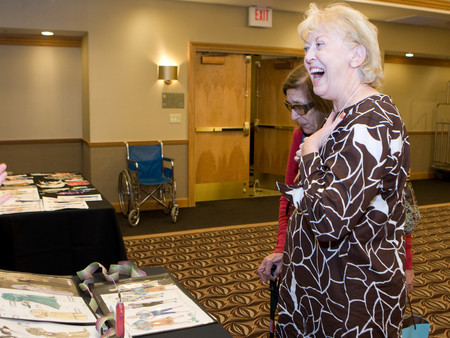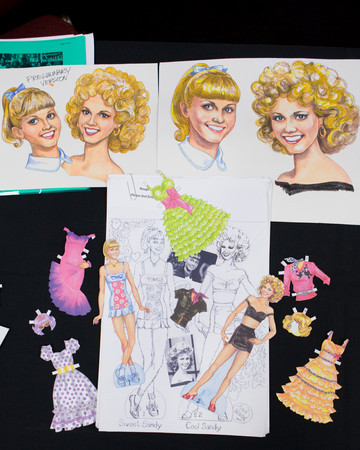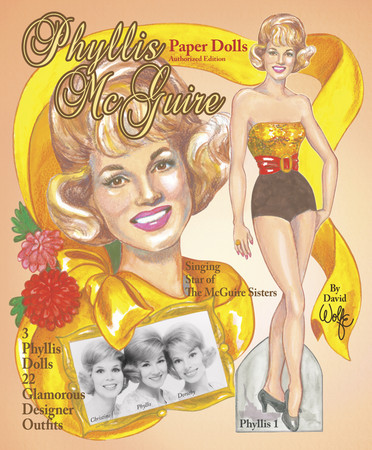Paper doll conventioneers passionate about collecting
Plastic Barbies didn't get an invitation. Madame Alexander collectibles have no business here. Cabbage Patch Kids will go orphaned another week. The approximately 150 conventioneers at the National Paper Doll Convention at Embassy Suites prefer their dolls with perforated edges.
"I just wanted to get back the (paper dolls) I had childhood memories of," says Pam Brittenham of her collection's origins. Now in her late 50s, the caregiver and writer from Cleveland began searching for some of her favorites, such as Elizabeth Taylor, when she heard people actually collected paper doll books (which package the dolls and their accompanying outfits) some 20 years ago. The Barbie doll had just launched in toy stores when Brittenham was a young girl, but she remembers shunning all three of its dimensions in favor of her paper dolls. She compares it to listening to music on vinyl instead of a CD; the very charm of the product lies in its underdeveloped technology.
Paper dolls had their heyday in the late '40s when the war drained the United States of the raw materials to produce baby dolls. They also worked as fine marketing tools for movie studios, which were more than happy to have their big screen stars immortalized in the pre-action figure age.
Today, David Wolfe -- creative director of fashion retail consulting agency The Doneger Group by day and paper doll illustrator by night -- has created paper dolls of characters from "Grease," Phyllis Diller and, most recently, Las Vegas' own Phyllis McGuire. As a fashion illustrator in Europe from the '60s through the '80s, opening the doors to McGuire's fashion museum of a closet provided a thrilling blast from the past. The "Sophie's Choice" part came in editing 180 iconic outfits down to just 20. A few of the looks that made the cut include a Pucci silver vinyl minidress, coat and hat from the '60s; a shaded rose chiffon long-sleeved evening gown from Bob Mackie in the '70s and a sheer gold ruffled floral gown from the '80s by Chanel.
"It could've been as thick as a telephone book," he says. "There isn't a dud in the entire collection."
The Phyllis McGuire doll will be published next month for $12.
Wolfe isn't the only paper doll connoisseur who works full time in the fashion industry. Scott Jorgensen of Chicago works as a vintage fashion researcher for auction houses and private collectors. For him, collecting original paper dolls beats watching Turner Classic Movies all day because he gets a close-up look at the garments' detail work. It doesn't hurt that the paper dolls require far less space than the actual clothes and the styling benefits come in handy, too.
"You learn what they were supposed to look like," he says of vintage accessorizing. "I wouldn't know how to put it in its place in history (if it weren't for paper dolls)."
Some collect purely for nostalgia purposes. Others for the fashion references, but for Dee Radcliffe, it's all about the art. "I just love the illustrations," she says. "Magazines today only use photos, but there was a time when they only used fashion illustrations."
Radcliffe was shocked to discover a paper doll of her younger self while perusing the convention floor. It pays to count paper doll enthusiasts as friends.
Most of the conventioneers here speak of a paper doll lull that lasted through the '80s and '90s. Then, out of nowhere they say, a paper doll momentum picked up a few years ago and blew the dust off old collections while introducing several new ones. That's largely thanks to Jenny Taliadoros who launched a paper doll publishing company, Paper Studio Press, in 2006. A third generation paper doll collector, she reproduced paper doll books of Lana Turner, Rita Hayworth and Betty Grable. Paper Studio Press plans to publish a Rosie the Riveter book by "King of Paper Dolls" Tom Tierney and is also responsible for Wolfe's aforementioned works.
Furthering the paper doll success, Dover Publications sold out of 40,000 Barack Obama paper dolls in two months. Its Michael Jackson doll probably will go next.
The sudden paper doll boom has been fun, but collectors such as Sherryl Shirran of Anaheim, Calif., worry what will become of it. As a paper doll collector and former doll hospital employee of 17 years, Shirran has tried to pass the love down to her grandchildren, but her attempts have been unsuccessful in the current Wii-minded times.
"It's aging," she says of the paper doll community. "It used to be we would see canes (at the conventions) but now we're seeing wheelchairs."




















